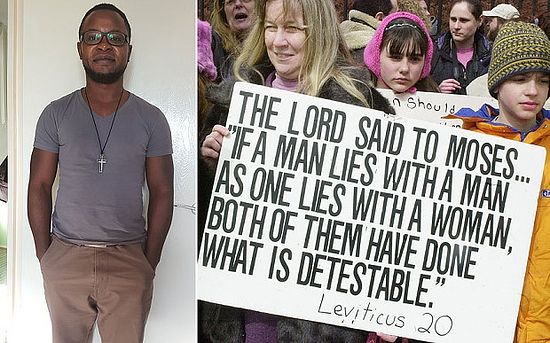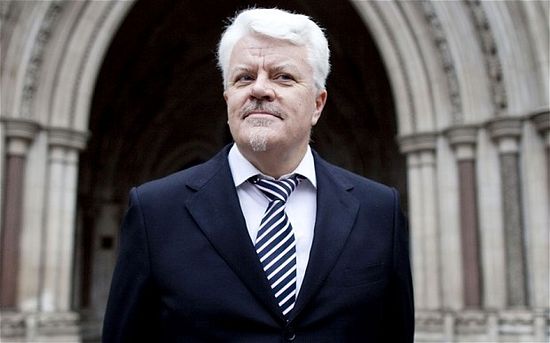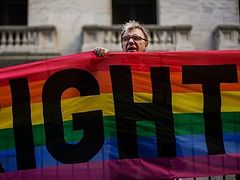Source: The Telegraph
February 27, 2016
 Felix Ngole, left, quoted a verse from Leviticus describing homesexuality as an "abomination" Photo: Getty
Felix Ngole, left, quoted a verse from Leviticus describing homesexuality as an "abomination" Photo: Getty
A Christian postgraduate student has been expelled from his course, effectively ending his chances of a career as a social worker, for voicing opposition to gay marriage in a Facebook discussion.
Felix Ngole, a 38-year-old father of four, expressed support for Kim Davis, the county clerk from Kentucky in the US who was jailed for refusing to issue marriage licences after the introduction of same-sex unions in September last year.
 Kim Davis, an Apostolic Christian, was sent to prison in Kentucky for her stance in refusing to follow court orders Photo: Reuters
Kim Davis, an Apostolic Christian, was sent to prison in Kentucky for her stance in refusing to follow court orders Photo: Reuters
He argued that homosexual activity is against the teaching of the Bible, quoting a verse from Leviticus describing it as an "abomination".
The post, from his private Facebook account, was part of a discussion thread in which other users voiced their opinions on all sides of the debate.
It was not until two months later that he was summoned to a disciplinary hearing at Sheffield University after a fellow student complained about his post.
He said he was initially not even told what he was accused of doing. He was eventually told that it involved breaching social work guidelines on "personal conduct" and "bringing the profession into disrepute".
At a further hearing, a university "fitness to practise" panel concluded that he was entitled to his opinion on the issue of gay marriage but that there was a danger he "may have caused offence to some individuals" by voicing it.
They concluded that, even though he was not yet even qualified as a social worker, his comment on the Facebook thread would affect his ability to operate in the profession.
As a result he was effectively expelled from the university, ordered to hand in his student ID and even his library card.
The case has striking parallels with that of Adrian Smith, a housing trust manager from Trafford, Greater Manchester, who was demoted in 2011, effectively having his salary halved, over a private Facebook post in which he voiced opposition to plans for gay marriage.
The trust claimed that Mr Smith's posting could damage its reputation for "diversity" and that even though it had been posted outside work it breached policies forbidding upsetting colleagues.
 Adrian Smith wrote on Facebook that he thought same-sex weddings in churches were "an equality too far" Photo: WARREN ALLOTT
Adrian Smith wrote on Facebook that he thought same-sex weddings in churches were "an equality too far" Photo: WARREN ALLOTT
But, in a landmark ruling at the High Court, Mr Justice Briggs said that Mr Smith had done "nothing wrong" in expressing his view and that on the contrary his employer was guilty of a "serious and repudiatory breach of trust".
Crucially, he made clear in a written judgment that there is no right in law not to be offended - and that offence is the "necessary price" of free speech.
Mr Ngole - who originally came to the UK from Cameroon as an asylum seeker in 2003 and has since gained two university degrees and worked as a teacher - said that, far from discriminating against others, he had suffered religious discrimination.
“The way I was treated made me feel that their duty of care to me immediately ended from the day they received that complaint," he said.
"I am not against people who are in same-sex relationships, that is their choice, but I am a Christian and if asked for my views I should be free to express that.
“I didn’t intimidate anyone and I didn’t treat them in a discriminatory manner.
"I have worked with people in same-sex relationship in the past and there has been no issue whatsoever but the university said that if someone Googled me and found that (comment) they would not be confident to come to me for support."
Mr Ngole has lodged an appeal with the university but is expected to launch a full legal challenge on human rights grounds if he is not successful.
He is being supported by the Christian Legal Centre and will be represented by the barrister Paul Diamond.
Crucially, he will challenge the university's claim that he was unfit to practise as a social worker not because he had offended anyone but because of the possibility that he might.
"I don’t see how you can end somebody’s professional career based on something that is untested and unproven," he said.
"You can’t lose a job because somebody says you are more likely to offend people, that’s unfair."
In his appeal letter to the university he specifically presses them on whether they monitor the social media accounts of those with strong political opinions or different views on sexual morality.
Pointedly, he also questions what action they would take against a Muslim student who expressed a sincere belief in Sharia law.
Andrea Williams, chief executive of the Christian Legal Centre, said: “What is absolutely shocking is that we have got a student who expresses a view on his own private Facebook page and is removed from a university course and effectively barred from professional vocational training for voicing opinions which are held by millions of people around the world.
“A university is shutting down the possibility of him pursuing his chosen career by ending his professional training.
“This is just the latest step in a long line of cases in which professions have been closed off to Christians.
“But now we are seeing it at the university stage – the very place where we are supposed to be able to discuss different opinions.”
In a letter expelling Mr Ngole from the university, a departmental official said: “Members of the committee expressed serious concerns about the level of insight you had demonstrated with regards [sic] to the comments you posted on Facebook.
“The committee were clear to point out that their decision is not based on your views but on your act of publicly posting those views such that it will have an effect on your ability to carry out a role as a social worker.
“Members were in agreement that this action was an extremely poor judgement on your part and had transgressed boundaries which are not deemed appropriate for someone entering the social work profession.
“It was their belief that this may have caused offence to some individuals.”



